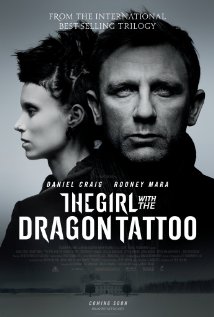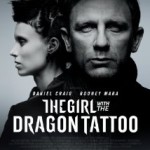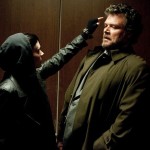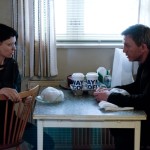The practice of remaking foreign language movies in English because it is deemed that Americans in particular don’t like subtitles, and of course the inclusion of a couple of A-listers, is one of the more unnecessary practices espoused by the film industry, one which becomes wholly objectionable when the plot is changed to give a happy ending, say (see the remake of The Vanishing as a prime example, brutalising the brilliant Dutch original.) The remake of The Girl With The Dragon Tattoo, the first episode in Stieg Larsson‘s compelling Millennium trilogy is, thankfully, not objectionable, though in light of the truly outstanding Swedish adaptation could well be classed as superfluous in that it does not add to the story, even if it does a few minor things differently. My review of the originals can be seen here.
Viewed in isolation this is a movie with the weight and gravitas appropriate both to the book and the original movie. Its raw materials are of fine quality, with Daniel Craig a creased and craggy Mikael Blomkvist after the style of Michael Nyqvist‘s Blomkvist; Rooney Mara takes on spiky Lisbeth Salander in the steps of Noomi Rapace to good effect, with appearance almost a direct copy – from the skinny form to the piercings and tattoos, heavy black make-up and aggressive attitude; Christopher Plummer is a charismatic Henrik Vanger, and the rest if the cast play roles sinister and sympathetic to good effect.
Vanger’s description of his family, all of whom live on the island, holds good – you would not trust a single one of them to mind a sweet shop for half an hour, let alone behave in a morally admirable fashion, but who among them has most to hide?
So far almost a dead ringer, language barrier apart. The plot line is not so very different either. If you knew the answer to my question in the previous paragraph, it will not be any different this time around. If anything this version is darker (physically and metaphorically), marginally the less humorous and arguably less brutal, by virtue of drawing a veil over two key scenes in particular, leaving more to the imagination of the audience. Maybe there’s a little more sex, not that this is a story dependent on sexual relationships – though rape and sexual violence do play a pivotal role (the original title of the book means “men who hate women.”)
It does demand tension and building suspense as the odd couple of Blomqvist and Salander start to find leads in the disappearance of Harriet Vanger 20 years before from the remote island of Helmstad, and then links to a bizarre series of murders with biblical connotations, and it delivers in a quiet and austere fashion reminiscent of Larsson’s bleak Swedish outlook. Here the director comes into his own.
The director in this case is David Fincher, a Hollwood heavyweight, known as a safe pair of hands and with the skill to handle a narrative in a clear and coherent manner, given to the occasional flourish to help him stand out from the crowd but otherwise solid and dependable (see The Social Network, Se7en, Zodiac, The Curious Case Of Benjamin Button etc.) Perhaps Fincher is on this occasion slightly restrained and playing within himself, but then the circumstances demanded a touch of playing within himself and not departing too far from the source material. I’m quite sure he was conscious of the comparisons, do choosing to stick closer than the norm to Larsson’s text was probably a wise move.
Some of his decisions seem odd though. Did this movie need to start with a beat box version of Led Zeppelin‘s Immigrant Song? Probably not, though the music chosen is modern, mostly chilled and downbeat, and well-suited to the sombre mood of the piece. I’d also question whether Steven Zaillian‘s script needed quite so many added clues in case members of the audience had not quite caught up with what was happening. The original used visual cues better and did not feel the need to gild the lily to anything like the same extent.
The bottom line for me is that I watch with subtitles anyway, so Swedish is not a barrier any more than hearing the words in English. An English version was by no means essential if the originals had been marketed better, even one so similar, though since it does exist it’s a perfectly acceptable substitute for those who missed the Swedish trilogy. However, this brings me on to a key point: maybe Fincher intended to remake the whole trilogy but didn’t get the ratings or the funding? If you saw the Fincher/Craig/Mara adaptation, your only choice for the remainder of the trilogy are the Oplev/Nyqvist/Rapace films – and if you do that you might just as well have watched them from the start.













